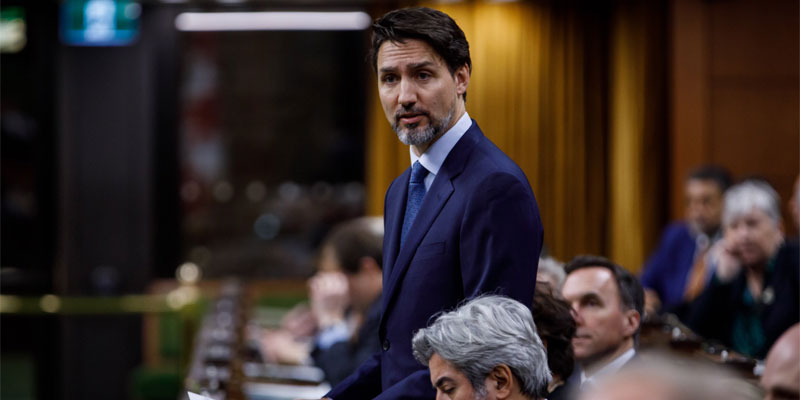Trudeau government sets sights on legal gunowners—while ignoring criminals

Last week, the Trudeau government introduced Bill C-21, which would dramatically expand police powers in Canada. Prime Minister Trudeau claims the legislation will combat gun violence and keep communities safe, but none of the bill’s provisions directly address gun violence or violent crime.
Instead, the bill demonizes legal firearms owners, who are not the problem, invents a variety of new administrative crimes and creates a “red flag” law that allows police to search and seize property (with a court order) on the grounds that a potentially dangerous individual has a firearm. Of course, the “red flag” provision is not new. Such a provision already exists and has for 20 years. Concerned individuals can dial 911 or medical doctors can call the Chief Firearms Officer.
Indeed, Bill C-21 violates due process in two ways—it allows anyone to ask the courts for a warrantless search and seizure and provides no provision for the targeted person to defend him or herself before the judge. In fact, the suspected “dangerous” person doesn’t even have to own a firearm. The judge only needs to believe the person “might have access to any such thing.” Clearly, this legislation opens the door for searches based on spurious grounds, where law-abiding Canadians, who pose no risk to themselves or others, are vulnerable to vindictive neighbours, former partners or busybodies.
Moreover, despite repeated claims, the bill will not make women safer. According to Statistics Canada, firearms are involved in approximately one per cent of domestic violence cases. And spousal violence typically involves repeat offenders who are already prohibited from legally owning firearms.
In another controversial provision, Bill C-21 allows municipalities to ban handguns from legal owners, circumventing provincial jurisdiction, by passing bylaws and informing the federal government, which then enforces the ban by revoking the registration certificates of owners living in those jurisdictions. Obviously, this only affects owners who’ve registered their handguns—not criminals. While the provinces may object to this on Constitutional grounds, the Supreme Court, given previous decisions, could support this use of the criminal code by Ottawa. Again, because the bill targets legal gunowners while ignoring criminals, it won’t curb gang shootings or domestic violence. Data from StatsCan confirm that hunters and sport shooters are law-abiding, and legally purchased firearms are rarely involved in criminal violence, either through theft or ”straw purchases” where a valid firearms licence holder purchases firearms for criminals.
Bill C-21 also provides the legal framework justifying last year’s ban of 1,500 models and variants of legally owned firearms, although the ban’s details and costs remain unknown. The ban effectively covers hundreds of thousands of lawfully owned firearms. Perhaps surprisingly, owners of these supposedly dangerous weapons are allowed to keep them until the government gets around to dealing with them even though these firearms are now banned because "(t)here is no use and no place for such weapons in Canada." Indigenous Canadians can continue to use them for hunting.
The bill also fails to clarify the so-called “buyback” program. It appears that legal owners could surrender their firearms for possible compensation or keep them locked in safes to be surrendered for destruction (without compensation) after the owner dies. How much will this cost? The government has not yet provided a clear estimate but it could easily become a multi-billion-dollar boondoggle. Indeed, the government has struggled to simply find a contractor to administer the “buyback” program.
Finally, the Trudeau government says its targeting “assault-style” firearms, a made-up term meant to frighten people unfamiliar with firearms and firearms laws in Canada. In fact, actual assault rifles, which are fully automatic and used by the military, were banned decades ago. Bill C-21, alongside last year’s sweeping gun ban, bans anything that merely looks like a military firearm including basic hunting rifles, air guns and even replicas. How will this keep anyone safe? None of the newly banned firearms have been used for criminal violence. None.
As a result, the only firearms confiscated under this new bill will be owned by men and women who’ve been vetted by police and dutifully follow Canadian law. Instead of providing additional resources to police to combat gun smuggling and gang activity, this legislation invents new administrative crimes that merely increase the complexity of firearms laws. Instead of supporting struggling municipalities dealing with the social and economic problems caused by COVID-19 and the lockdowns, Bill C-21 offers no help at all. When will governments get serious about the real problems facing troubled youth attracted by gangs or desperate individuals contemplating suicide?
Canadian police chiefs, the RCMP police union and many working police members oppose these measures because they know that enforcing these new useless laws will remove potentially tens of thousands of policing hours from frontline police work. According to Bill C-21, legal gunowners are the problem. But forcing law-abiding Canadians to surrender their firearms will not solve the problems of criminal gang activity or domestic violence in this country.
Author:
Subscribe to the Fraser Institute
Get the latest news from the Fraser Institute on the latest research studies, news and events.

